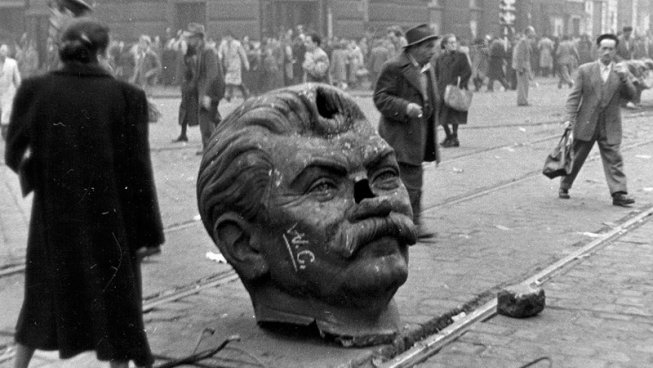The nature of the Hungarian Stalinist regime is obviously closely linked to that of Stalinism in the Soviet Union. The main Stalinist leaders in Hungary were directly attached to the bureaucratic apparatus that ruled the Soviet Union. The brutality of Hungary’s police regime was very similar to that which existed in the Soviet Union since the mid-1920s. There was, however, an important difference. Although the bureaucracy benefited from a relative legitimacy among the masses in the Soviet Union, the Stalinist leaders in power in Hungary had almost no legitimacy among the workers and peasants. During the war, like so many other Stalinist leaders in Europe (the French Communist Party’s Maurice Thorez for example), they fled to the Soviet Union to live there. Unlike the Communist Party’s rank and file, they did not fight against the occupier. They only returned to Hungary once the country was liberated from Nazi occupation. Their main mission was to represent the Soviet bureaucracy’s interests locally. As such, their subordination to Moscow was absolute.
But Moscow’s policies were the political expression of a completely bureaucratized ruling minority. This bureaucracy was the very result of the bureaucratic degeneration of the Soviet Union. The economic, cultural and social backwardness of Czarist Russia compared with the West, further aggravated by the WWI and years of civil war in the early 1920s, along with the isolation of the new workers’ state after the failure of revolutions in Europe, were the main causes of this degeneration.
Although the social bases of the workers’ state, notably the nationalization of the means of production, were maintained, a bureaucracy politically expropriated the country’s workers and peasants. The state apparatus controlled by Stalin and this bureaucratic caste became a tool to repress and oppress the working class: the soviets were dissolved, the trade unions were emptied of their contents and, in total service of the bureaucracy, confined to the role of disciplining the working class. The Stalinist police dictatorship progressively eliminated, with the most barbaric methods, all revolutionary opposition, including Leon Trotsky who was assassinated by a Stalinist agent in Mexico. However, this totalitarian construction was not unfailing. The internal and external contradictions became stronger and pushed the bureaucracy to oftentimes waver abruptly from right to left. The situation was thus far from stable.
At the end of WWII, the Red Army’s role in defeating Nazi Germany gave, although only momentarily, Stalinism a great prestige among the masses on a global scale. Its militarily achievements allowed it to establish in Central and Eastern Europe a series of so-called “socialist” regimes, fashioned in the very image of Stalinism in the Soviet Union. In other words, these regimes were bureaucratically deformed workers’ states from the very start.
In 1937, in his “The USSR in War”, Trotsky, predicting a scenario of this kind, wrote that “in the territories scheduled to become a part of the USSR, the Moscow government will carry through the expropriation of the large landowners and statification of the means of production. This variant is most probable not because the bureaucracy remains true to the socialist program but because it is neither desirous nor capable of sharing the power, and the privileges the latter entails, with the old ruling classes […] Inasmuch as Stalin’s Bonapartist dictatorship bases itself not on private but on state property, the invasion of Poland by the Red Army should, in the nature of the case, result in the abolition of private capitalist property, so as thus to bring the regime of the occupied territories into accord with the regime of the USSR.”
These regimes inherited all the economic, political and social contradictions of the Soviet Union, but with weaker and less consolidated state apparatuses. The risks of revolt and revolution were thus potentially stronger. As such, one could have possibly expected that revolutionary movements capable of overthrowing the Stalinist bureaucracy and regenerating the deformed workers’ state could come from the countries of the “Eastern Bloc.” The Hungarian Revolution was probably the most convincing piece of proof for this.











